Key takeaways:
- Fairness in sentencing should prioritize equality and proportionality, considering socio-economic factors that influence outcomes.
- Restorative justice programs focus on healing and dialogue between victims and offenders, promoting accountability over punishment.
- Alternatives to traditional sentencing, such as community service and rehabilitation, can reduce recidivism and emphasize personal growth.
- The anti-death penalty movement highlights the systemic biases in capital punishment and advocates for a justice system that values rehabilitation over retribution.
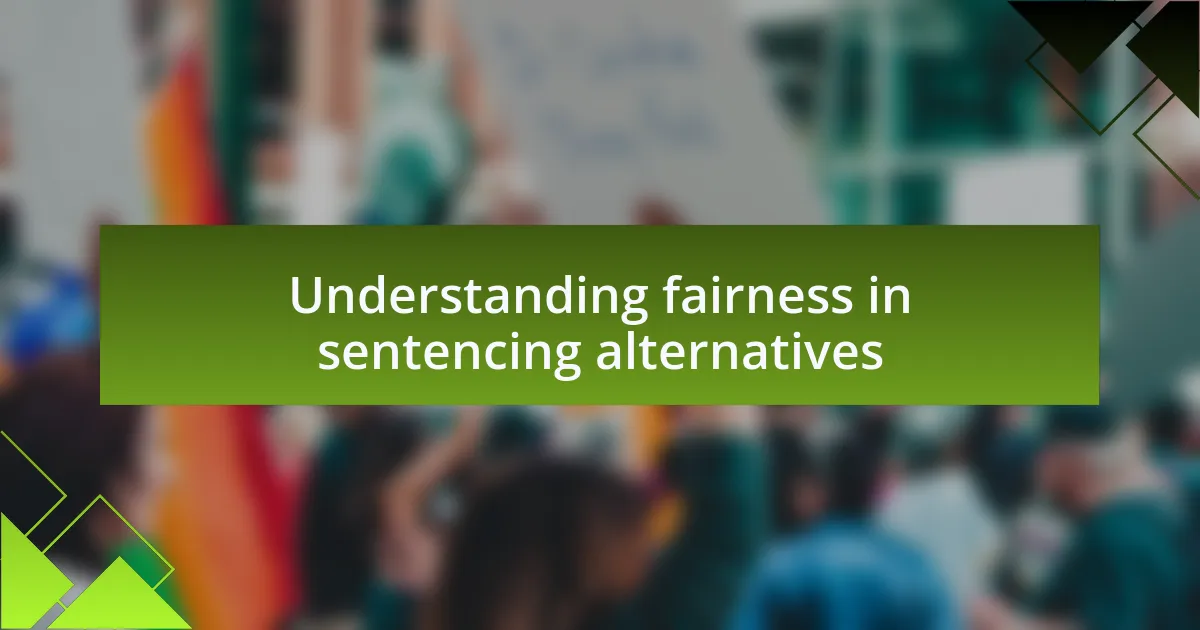
Understanding fairness in sentencing alternatives
Fairness in sentencing alternatives often hinges on the principles of equality and proportionality. I often find myself reflecting on how different backgrounds and circumstances can lead to vastly different sentences for similar crimes. Have you ever considered how a person’s socio-economic status might influence their sentencing? This perspective is crucial in evaluating whether justice truly serves all equally.
When I think about restorative justice programs as an alternative, I feel a sense of hope. These programs focus on healing rather than punishment, allowing victims and offenders to engage in dialogues that can lead to accountability and understanding. In my experience, seeing offenders take genuine steps to make amends can be far more impactful than a lengthy prison sentence.
Exploring alternatives to traditional sentencing can evoke a mix of emotions. On one hand, there’s relief at the possibility of more humane approaches; on the other, skepticism about their effectiveness. I’ve personally witnessed cases where community service or rehabilitation programs led to successful reintegration of offenders, sparking the question: shouldn’t we prioritize second chances over mere retribution? Engaging with these alternatives pushes us to consider what true fairness looks like in our justice system.
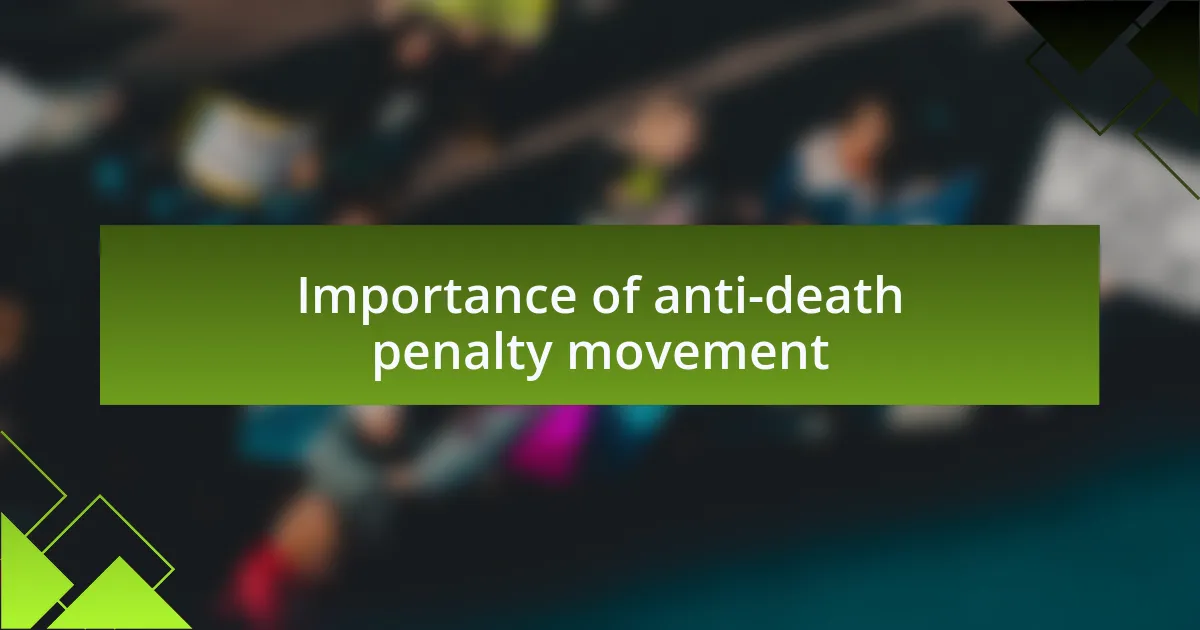
Importance of anti-death penalty movement
The anti-death penalty movement is paramount in challenging a system that is often influenced by biases and prejudices. Personally, I have seen how certain jurisdictions implement capital punishment disproportionately against marginalized communities. This not only calls into question the humanity of our justice system but highlights the need for reform that prioritizes fairness and equity.
Engaging with conversations around this movement reminds me of the stories of individuals who have exonerated thanks to appeals and advocacy. Imagine being wrongfully convicted and living in fear of losing your life. It makes me ponder the inherent flaws in our judicial processes. Every life matters, and the stakes are too high to ignore the imperfections that can lead to irreversible consequences.
Moreover, the movement encourages us to consider the broader implications of justice beyond mere punishment. When I hear advocates speak passionately about rehabilitation over execution, it resonates deeply with me. Could it be that focusing on healing and restoration may lead to safer communities? This perspective challenges us to envision a justice system that values life and seeks redemption rather than retribution.
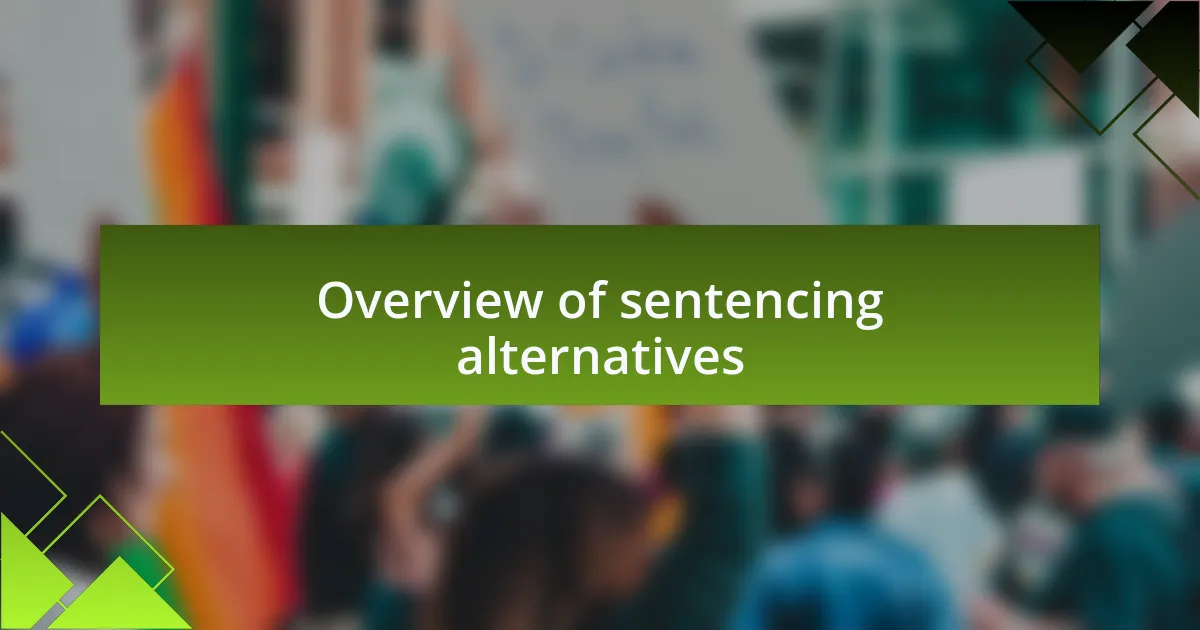
Overview of sentencing alternatives
Sentencing alternatives represent a pivotal shift in how we address justice and rehabilitation. From my experience, options such as probation, restorative justice programs, and community service have shown remarkable potential in reducing recidivism rates while allowing individuals to remain connected to their communities. This approach not only emphasizes accountability but also promotes an environment for personal growth and change.
One alternative that particularly resonates with me is restorative justice, where victims and offenders engage in dialogue about the harm caused. I remember attending a local forum where a survivor shared their experience of healing after participating in such a program. It made me reflect: can we truly foster understanding and prevent future offenses through conversation rather than punishment? The power of empathy and reconciliation in these settings can transform lives, altering the narrative from one of vengeance to one of healing.
Moreover, the use of rehabilitation programs within facilities serves as another compelling alternative. I’ve seen firsthand how educational and vocational training can provide inmates with skills and hope for a brighter future. Isn’t it worth considering how investing in people instead of punitive measures can lead to safer societies? This paradigm shift pushes us to rethink our definitions of justice and fairness, advocating for approaches that prioritize human dignity over mere punishment.
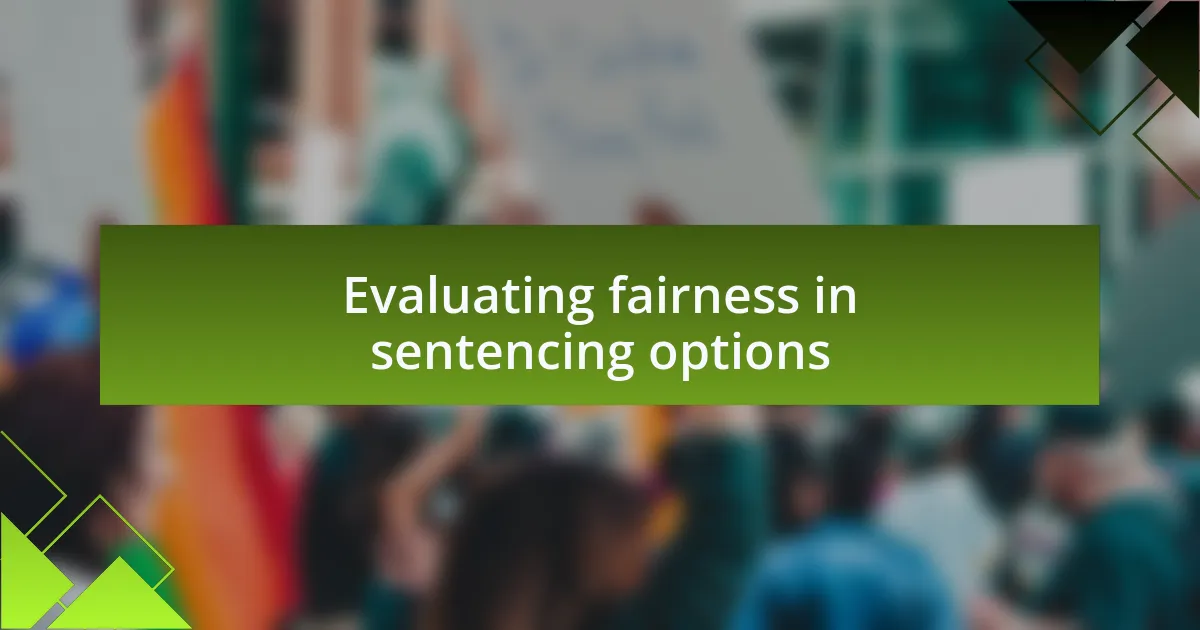
Evaluating fairness in sentencing options
Evaluating fairness in sentencing options requires a deep dive into how these alternatives actually impact individuals and communities. I recall a young man I met during a volunteer program who had been given probation instead of prison time for a non-violent offense. His story revealed the profound difference a supportive environment can make—rather than being isolated and branded as a criminal, he had the opportunity to rebuild his life while still facing the consequences of his actions. Isn’t it fascinating how the right sentencing option can promote healing over harm?
In considering fairness, I often ponder how different backgrounds affect the outcomes of sentencing alternatives. During discussions with colleagues and friends, we’ve shared cases where individuals from marginalized communities received harsher penalties despite similar offenses. This disparity emphasizes the need for a more equitable approach to justice. I can’t help but ask myself: how can we ensure that sentencing alternatives truly serve everyone?
Furthermore, the concept of restorative justice strikes me as particularly relevant in the conversation about fairness. I’ve witnessed how victims, when given the chance to express their pain, often find unexpected closure. It makes me question traditional punitive measures: do they really facilitate justice, or do they simply perpetuate a cycle of anger and resentment? Fairness should not only be about punishment but also about healing for all involved, and it’s essential that we adjust our methods to reflect this understanding.
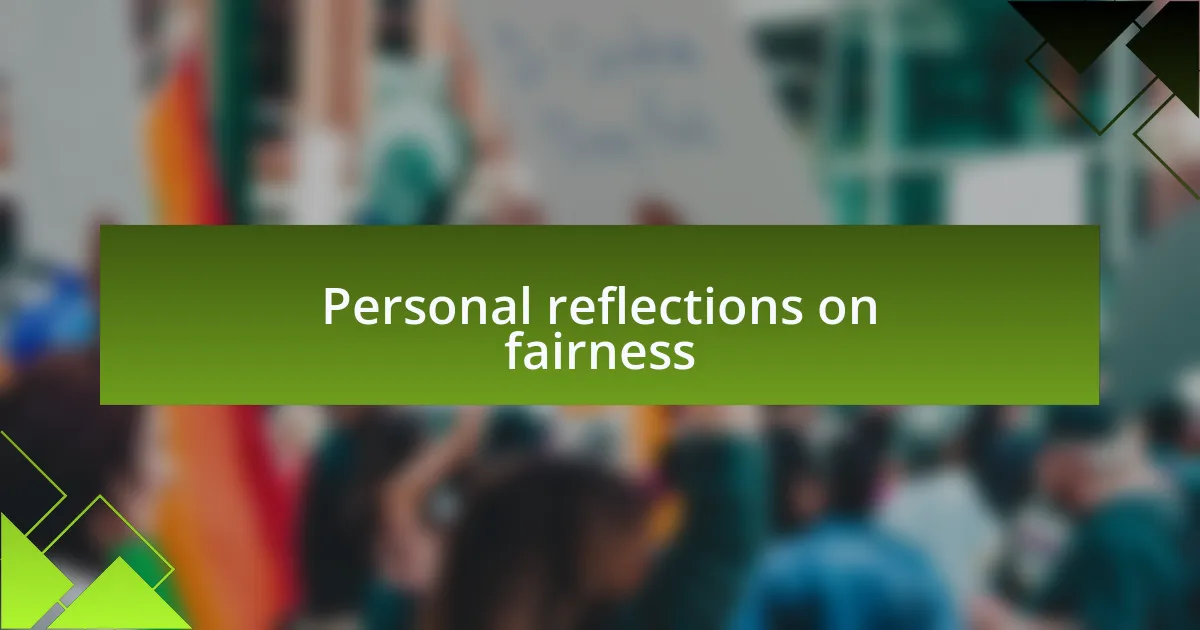
Personal reflections on fairness
Fairness is not a one-size-fits-all concept. I remember attending a community forum where individuals shared stories of how leniency in sentencing changed their paths. One mother spoke about her son, who received a second chance through a diversion program rather than jail time. Her relief was palpable; she emphasized that his success was not just a matter of luck but a critical intersection of support and opportunity. It made me reflect on how fairness in sentencing can ripple beyond the individual and positively shape families and neighborhoods.
In a conversation with a friend, who works as a public defender, I learned about the struggles they face advocating for clients who are often at the mercy of biased systems. They shared an experience of representing a young woman who, despite her obvious remorse and willingness to make amends, faced significantly harsher penalties due to preconceived notions based on her background. It struck me deeply—how can we claim to uphold fairness if our justice system is swayed by these invisible biases? I find myself questioning the adequacy of our current alternatives and the narratives that shape them.
Ultimately, I feel that true fairness in sentencing must prioritize the individual’s potential for rehabilitation over mere punishment. I once volunteered at a local rehabilitation center where I met several individuals eager to reintegrate into society. Their stories of perseverance and transformation compelled me to consider: isn’t fairness about giving people the chance to change, to learn from their mistakes? I believe that as we strive for a more just system, we need to focus less on punitive measures and more on cultivating environments that foster growth and redemption.
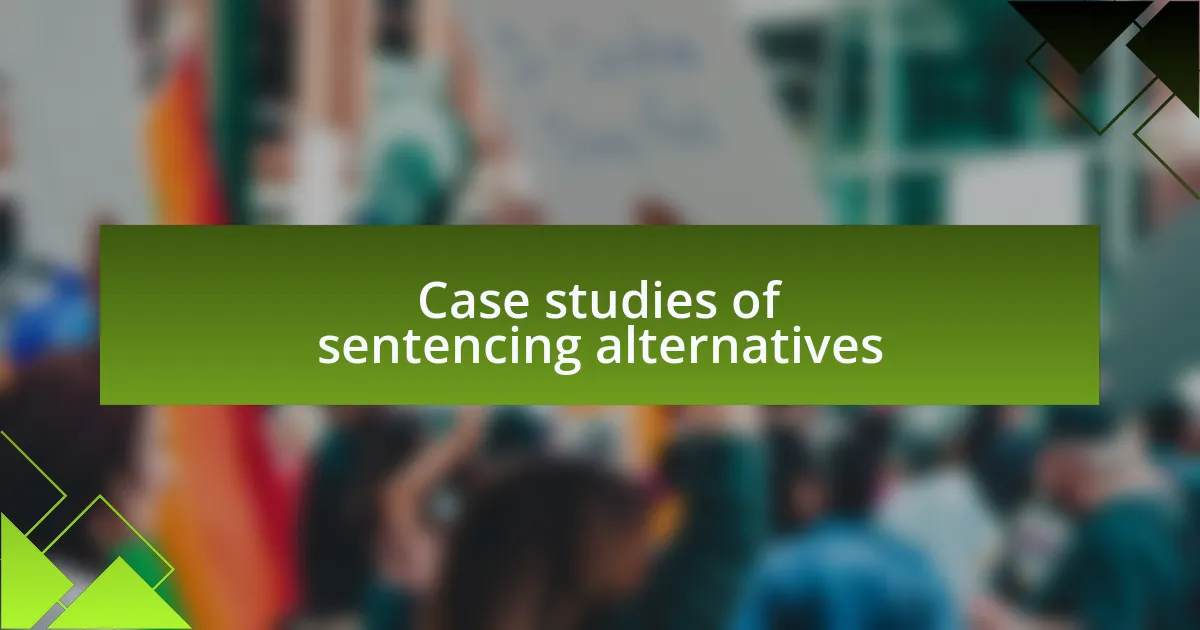
Case studies of sentencing alternatives
One compelling case study involved a county in California that implemented restorative justice practices for youth offenders. Instead of facing traditional sentencing, a group of young individuals participated in circles where they confronted their actions and the harm they caused. I still remember the stories of two teenagers who, after expressing their remorse, forged genuine connections with their victims. Witnessing this transformation made me wonder: could this approach be the key to breaking the cycle of recidivism?
Another notable example comes from New Zealand, where the Family Group Conference model empowers families to actively participate in the sentencing process. I learned about a father who, instead of a prison term, collaborated with his son’s community to create an actionable plan that focused on education and personal growth. This left me pondering how often we overlook the family’s role in rehabilitation—aren’t these ties essential for genuine accountability?
In my exploration of alternatives, I also came across a program in Germany, where offenders could opt for community service rather than incarceration for minor crimes. One participant shared how this experience helped him discover a newfound sense of purpose through volunteering. I can’t help but ask: isn’t this what we should aim for—transformative experiences that uplift both the individual and society, rather than mere punishment?